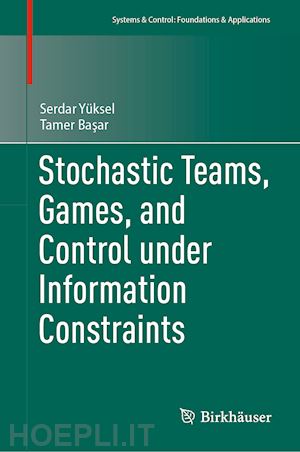
Questo prodotto usufruisce delle SPEDIZIONI GRATIS
selezionando l'opzione Corriere Veloce in fase di ordine.
Pagabile anche con Carta della cultura giovani e del merito, 18App Bonus Cultura e Carta del Docente
This monograph presents a mathematically rigorous and accessible treatment of the interaction between information, decision, control, and probability in single-agent and multi-agent systems. The book provides a comprehensive and unified theory of information structures for stochastic control, stochastic teams, stochastic games, and networked control systems.
Part I of the text is concerned with a general mathematical theory of information structures for stochastic teams, leading to systematic characterizations and classifications, geometric and topological properties, implications on existence, approximations and relaxations, their comparison, and regularity of optimal solutions in information. Information structures in stochastic games are then considered in Part II, and the dependence of equilibrium solutions and behavior on information is demonstrated. Part III studies information design through information theory in networked control systems – both linear and nonlinear – and discusses optimality and stability criteria. Finally, Part IV introduces information and signaling games under several solution concepts, with applications to prior mismatch, cost mismatch and privacy, reputation games and jamming.
This text will be a valuable resource for researchers and graduate students interested in control theory, information theory, statistics, game theory, and applied mathematics. Readers should be familiar with the basics of linear systems theory, stochastic processes, and Markov chains.
Introduction.- Part I: Stochastic Teams and a Mathematical Theory of Information Structures.- An Introduction to Stochastic Team Theory and Solutions to Static Teams.- Information Structures in Decentralized Stochastic Control.- Existence, Structure, and Approximations to Optimality: Strategic Measures in Decentralized Stochastic Control.- Control Policy Topologies and Dynamic Programming Methods in Decentralized Stochastic Control.- Many-Agent Convex and Non-Convex Exchangeable (Mean-Field) Teams and Optimality of Symmetric Policies.- Comparison of Information Structures and Their Blackwell Ordering.- Continuity, Existence, and Topological Properties of Optimal Cost on the Space of Information Structures.- Part II: Stochastic Game Theory and Information Structures.- An Introduction to Stochastic Game Theory.- Information Structures in Stochastic Dynamic Games, Equilibrium Concepts, and Informational Properties.- Information Structure Dependent Properties: Existence, Comparison, Continuity of Equilibria and Team-against-Team Games.- Part III: Information Design via Information Theory in Networked Systems and Control.- Coding for Control and Connections with Information Theory.- Stochastic Stabilization of Linear Systems under Information Constraints.- Stochastic Stabilization of Non-Linear Systems: Information Theoretic versus Stochastic Geometric Analysis.- Optimal Real-Time Coding and Control under Information Constraints: Structural and Existence Results.- Optimal LQG Coding and Control: Separation Results, Information Theoretic Methods, and Optimality of Linear Policies.- Optimal Coding under Small Estimation Error and Observability Criteria.- Part IV: Information and Signaling Games.- Signaling Games: Equilibria under Misaligned Criteria or Mismatched Priors between an Encoder and a Decoder.- Two Classes of Signaling Games: Reputation and Information Privacy Games.- Zero-Sum Information Games: Jamming and Witsenhausen's Counterexample as a Game.- Appendix A:Topological Notions and Optimizations.- Appendix B: Probability Theory and Stochastic Processes.- Appendix C: On Spaces of Probability Measures.- Appendix D: Markov Chains, Martingales, and Ergodic Processes.- Appendix E: Markov Decision Theory and Optimality of Markov Policies.- Appendix F: Stochastic Stability of Markov Chains and Random-Time State-Dependent Stochastic Drift.- Appendix G: Topological and Metric Entropy in Dynamical Systems.
Serdar Yüksel is Professor in the Department of Mathematics and Statistics at Queen's University.
Tamer Basar is the Swanlund Endowed Chair Emeritus and Center for Advanced Study Professor Emeritus in the Department of Electrical and Computer Engineering at the University of Illinois Urbana-Champaign











Il sito utilizza cookie ed altri strumenti di tracciamento che raccolgono informazioni dal dispositivo dell’utente. Oltre ai cookie tecnici ed analitici aggregati, strettamente necessari per il funzionamento di questo sito web, previo consenso dell’utente possono essere installati cookie di profilazione e marketing e cookie dei social media. Cliccando su “Accetto tutti i cookie” saranno attivate tutte le categorie di cookie. Per accettare solo deterninate categorie di cookie, cliccare invece su “Impostazioni cookie”. Chiudendo il banner o continuando a navigare saranno installati solo cookie tecnici. Per maggiori dettagli, consultare la Cookie Policy.